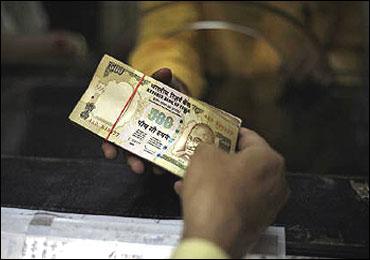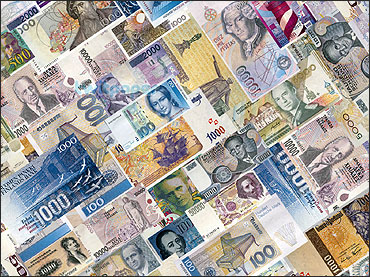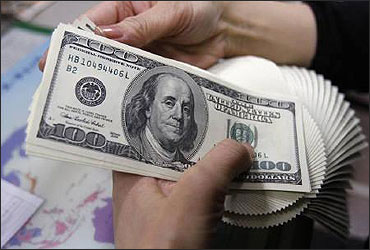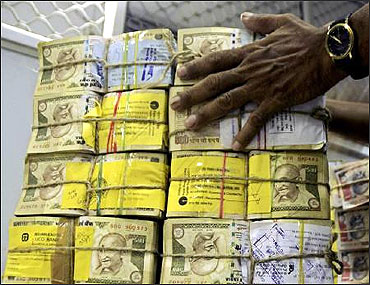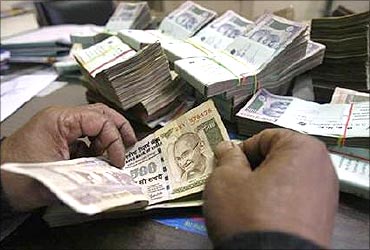 | « Back to article | Print this article |
Falling rupee: Gainers and losers
The Indian rupee has fallen by almost 11 per cent since August 1, thanks to rising risk aversion.
Experts believe unless the global macro environment stabilises, the rupee will continue to be under pressure as investors the world over flock to safe havens like the dollar.
And this is not good news for markets like India.
In a September 28 report, Manishi Raychaudhuri (managing director-head of research) and Gautam Mehta of BNP Paribas Securities India note, "Depreciating emerging market currencies have deleterious consequences on equity markets."
Click NEXT to read further. . .
Falling rupee: Gainers and losers
Historically, the Indian equity market has shown a strong positive correlation with the rupee movement.
So, it is not surprising that the market has fallen in recent times as the rupee depreciated -- it is down 9.6 per cent since August 1.
For individual companies, the impact of rupee depreciation will be positive for some and negative for some others.
Companies have various sources of exposure to the US dollar namely; exports, foreign currency denominated loans (foreign currency convertible bonds, external commercial borrowings, etc), international subsidiaries and import of inputs whose costs are linked to global commodity prices.
Click NEXT to read further. . .
Falling rupee: Gainers and losers
While most companies hedge their exposures to protect themselves from extreme currency volatility, this does not completely eliminate the risk to their earnings.
Analysts say the main worry pertains to the impact on their balance sheet rather than earnings.
They say companies with foreign currency liabilities are vulnerable to balance-sheet impairment.
However, the impact will have to be determined on a case-by-case basis, as there will be exceptions like Tata Steel, Hindalco and Marico that have a natural hedge to their currency exposure as they get significant revenues from their foreign subsidiaries.
Click NEXT to read further. . .
Falling rupee: Gainers and losers
For others, the balance-sheet impact is caused by the foreign currency denominated loans as well as unhedged receivables and payables from international units.
Says Ajay Parmar, head-research (institutional equities) of Emkay Global Financial Services, "The impact on balance sheet is more pronounced than the impact on earnings.
Though the average mark-to-market impact as a percentage of net worth is -0.9 per cent, the range is significantly wide with outliers at +2.0 per cent and -9.4 per cent."
In terms of balance-sheet exposure, players such as Jubilant Life (-9.4 per cent), Bharti Airtel (-6.4 per cent), Lanco Infratech (-5.3 per cent) will witness significant impact on their FY11 net worth, believes Parmar.
Click NEXT to read further. . .
Falling rupee: Gainers and losers
Raychaudhuri adds, "Currency depreciation may force companies to restate forex debt at a higher value and, correspondingly, reduce reserves.
"Some companies -- particularly in infrastructure -- may not be adequately pricing in risks to balance sheet impairment.
"While share price risk may be highest for Reliance Communications, Shipping Corporation of India, Lanco, Bhushan Steel and JSW Ispat, for most (except Lanco), recent share price declines seem to have adequately discounted currency risks."
From an earnings perspective, the currency depreciation is positive for information technology exporters, while it could hurt importers, especially in sectors like autos, oil & gas and engineering.
Click NEXT to read further. . .
Falling rupee: Gainers and losers
Companies in the cement and utilities space are also exposed to imported fuel and hence are vulnerable to rupee depreciation.
Rakesh Arora of Macquarie Securities says, "Sectors that tend to perform consistently in periods of weaker rupee coupled with non recessionary environment include energy, IT and healthcare.
Stocks that may benefit in this environment are Infosys, Reliance Industries, Cairn India and Dr Reddy's. One sector, which underperforms during rupee weakness, recession or no recession, is Financials."
Click NEXT to read further. . .
Falling rupee: Gainers and losers
The impact of the rupee's fall, however, can be different within a sector. For instance, the impact on the oil and gas sector will be mixed.
Both crude oil imports and realisation of petro products are linked to the US dollar. Given the fact that crude oil prices are holding to the $100 a barrel plus levels, players like Reliance Industries and Cairn India stand to benefit significantly.
On the other hand, oil marketing companies like IOC, BPCL and HPCL will be amongst key laggards as they import crude (pay in dollars) and sell their products at government-regulated prices (in rupees).
The net impact, however, on the earnings will also depend on a company's ability to retain the gains or pass the increase in costs.
